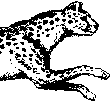Leopard Species Discovered

Genetic tests lead to the discovery on Borneo and Sumatra
by Beth Rowen
 Related LinksExternal Resources |
Imagine spending your entire life being confused with an entirely different species. That is what happened to the clouded leopard of Borneo and Sumatra. The animal, the biggest predator on Borneo, was long assumed to be the same species as the clouded leopard native to mainland Southeast Asia. Talk about an identity crisis!
Forty Differences Between Species
In March 2007, scientists at the U.S. National Cancer Institute announced that genetic testing had determined that there are about 40 differences between the two species. For example, the clouded leopard of Borneo and Sumatra has darker fur and smaller cloud markings than the mainland leopard. The spots inside the "clouds" on the island clouded leopard are more distinct than those on the mainland animal. The differences between the cousins are as marked as those between lions, tigers, and jaguars.
"Who said a leopard can never change its spots? For over a hundred years we have been looking at this animal and never realized it was unique," said Carter S. Roberts, president and CEO of the World Wildlife Fund (WWF).
Where in the world is Borneo?
According to the WWF, between 5,000 and 11,000 clouded leopards live on Borneo and another 3,000 to 7,000 inhabit Sumatra. Borneo is the third-largest island in the world. About two-thirds of Borneo is part of Indonesia; the rest is shared by Malaysia and Brunei. Sumatra is an Indonesian island.
Less than 2 million species have been identified on Earth, with estimates for the number of undiscovered species ranging from 10 million to 100 million. An estimated 15,000 species of animals are discovered each year. In fact, in 2006 alone 30 unique species of fish, two species of tree frogs, three species of trees, and 16 ginger species were discovered in the Heart of Borneo, a rainforest that is about as big as Kansas.
- More about Animals
